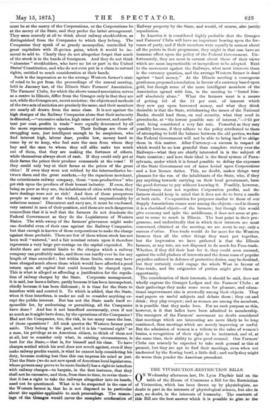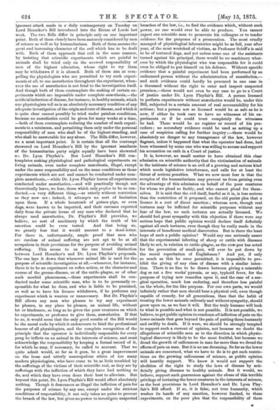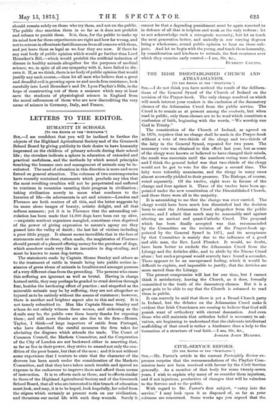THE VIVISECTION-RESTRICTION RILLS.
ON Wednesday afternoon last, Dr. Lyon Playfair laid on the table of the House of Commons a Bill for the Restriction of Vivisection, which has been drawn up by physiologist*, no doubt in part in the interests of physiological science, but also in part, no doubt, in the interests of humanity. The contents of this Bill are the beat answer which it is possible to give -to the- ignorant attack made in a- daily contemporary on Tuesday on Lord Henniker's Bill introduced into the House of Lords last week. The two Bills differ in principle only on one important point. Both of them clearly have been maturely considered by men of science as well as by humanitarians. Both of them assume the great and increasing character of the evil which has to be dealt with. Both of them approach that evil in the same manner, by insisting that scientific experiments which are painful to animals shall be tried only on the avowed responsibility of men of the highest education, whose right to try them may be withdrawn if it is abused. Both of them aim at com- pelling the physiologists who are permitted to try such experi- ments at all, to use anmsthetics throughout the experiment, when- ever the use of anmsthetics is not fatal to the investigation itself. And though both of them contemplate the making of certain ex- periments which are impossible under complete anmsthesia,—the artificial induction of disease, for instance, in healthy animals, which our physiologists tell us is an absolutely necessary condition of any adequate investigation of the origin and cure of disease, and which it is quite clear cannot possibly be tried under painless conditions, because no anmsthetics could be given for many weeks at a time, —both of them contemplate reducing the number of such experi- ments to a minimum, and permitting them only under the personal responsibility of men who shall be of the highest standing, and who shall be answerable for any abuse. The Bills differ, however, on a most important point. It is certain that all the contempt showered on Lord Henniker's Bill by the ignorant assailants of the humanitarian party might equally have been showered oa Dr. Lyon Playfair's. But Lord Henniker's Bill con- templates making physiological and pathological experiments on living animals, even under complete anmsthesia, illegal, except under the same responsibility and on the same conditions as those experiments which are not and cannot be conducted under com- plete ancesthesia,—while Dr. Lyon Playfair leaves all experiments conducted under anmsthetics,—and will practically though not theoretically leave, we fear, those which only profess to be so con- ducted,—a very different thing,—as utterly without restriction as they now are ; indeed, it attempts no sort of limitation upon them. If a whole hecatomb of guinea-pigs, or even dogs, were known to be imported, and their carcases exported daily from the private house of any man who declared that he always used anmsthetics, Dr. Playfair's Bill provides, we believe, no sort of machinery by which the truth of his assertion could be even tested. And that being so, we greatly fear that it would amount to a dead-letter. For there is, unfortunately, ample proof that men who are careless of animal suffering are not apt to be at all scrupulous in their provisions for the purpose of avoiding animal suffering. This seems to us the one broad distinction between Lord Henniker's and Dr. Lyon Playfair's proposals. The one lays it down that whenever animal life is used for the purpose of scientific investigation at all,—whenever, for instance, there is to be an experiment on reflex action, or the character and course of the grouse-disease, or of the cattle-plague, or of other such morbid phenomena,—these experiments shall be con- ducted under some scientific man, who is to be personally re- sponsible for what he does, and who is liable to be punished, as well as to have his licence withdrawn, if he performs any experiment which is wanton or unnecessary. But Dr. Playfair's Bill allows any man who pleases to try any experiment he pleases, in any place he pleases, on animal life, without let or hindrance, so long as he gives the poor creatures on which he experiments, or professes to give them, anmsthetics. If that be so, it would seem that the only good results of the Bill would be the moral code by which it endeavours to bind the professional honour of all physiologists, and the complete recognition of the principle that the operator is individually responsible for every pang he inflicts on an animal in the interests of science, and must acknowledge the responsibility by keeping a formal record of it, for which he may, if necessary, be called to account. That we quite admit would, so far as it goes, be a great improvement on the loose and utterly- unscrupulous ethics of too many modern physiologists, who have come to be as little troubled by the sufferings of the victims of their scientific zeal, as they are by sufferings with the infliction of which they have had nothing to do, and which they have even done their best to alleviate. But beyond this point, Dr. Lyon Playfair's Bill would effect absolutely nothing. Though it denounces as illegal the infliction of pain for the purposes of science by any one, except under the strictest conditions of responsibility, it not only takes no pains to prevent the breach of the law, but gives no power to investigate suspected breaches of the law, i.e., to find the evidence which,, without such power, no one would ever be able to produce. You cannot expect one scientific man to prosecute his colleague or to tender evidence for the purposes of a prosecution. The most cruelly managed of physiological laboratories might be as full, year after year, of the most wretched of victims, as Professor Schiff's is said to be of tortured dogs, and yet unless some one of the assistants turned against his principal, there would be no machinery what- ever by which the physiologist who was responsible for it could even be obliged to put himself on his defence. Without specific evidence that a painful experiment had been performed by an unlicensed person without the administration of anmsthetics,- and such evidence could hardly be procured in one case in a thousand without the right to enter and inspect suspected premises,—there would not even be any case to go to a Court of justice under Dr. Lyon Playfair's Bill. A person licensed to perform experiments without anmsthetics would be, under this Bill, subjected to a certain amount of real accountability for his actions; but a person not so licensed would be as safe as he is now, if either he took care to have no witnesses of his ex- periments or if he could trust completely the witnesses he had. There would be no register or record of his pro- cedure; no secondary evidence could be used as setting up a case of suspicion calling for further inquiry ;—there would be absolutely no danger to any transgressor of the law, however flagrant, unless it happened that what the operator had done, had been witnessed by some one who was willing to accuse and support his accusation on oath in a Court of justice.
It is, however, no small matter to have obtained this clear admission on scientific authority that the victimisation of animals in the interests of science is an evil of a growing and serious End which needs legislative interference, and calls for at least the threat of serious penalties. What we now most fear is that the scruples of the humanitarians may prevent us from gaining even the advantage of this admission on behalf of the poor creatures for whom we plead so feebly, and who cannot plead for them- selves. It is said that the evil itself, fearful as it is, is less serious than the restriction of it proposed, on the old purist plea that a licence is a sort of direct sanction ; whereas now, though real tortures may be inflicted for scientific purposes without any fear of the law, no such tortures are actually licensed. We should feel great sympathy with this objection if there were any serious hope that public opinion would declare itself definitely against all such tortures, even though they be really made in the interests of beneficent medical discoveries. But is there the least hope of such a public opinion? Would any one seriously assert that the experimental infecting of sheep or cattle with diseases likely to act, in relation to cattle-plague, as the cow-pox has acted for the prevention of small-pox, will ever be put down by the moral reprobation of Englishmen? And yet, if only so much as this be once permitted, it is impossible to pro- hibit the giving of any class of disease with a similar inten- tion. There is no line to be drawn between giving a miserable dog or cat a five weeks' p3rxmia, or say, typhoid fever, for the purpose of trying new remedies upon it, and the case of a sur- gical operation, much less enduring, and therefore less painful on thewhole, for the like purpose. For our own parts, we would infinitely rather that men should bear a physical evil, even though capable of remedy, for all generations, than that the habit of treating the lower animals callously and without sympathy, should grow upon us, as we fear it will. But the truly humane will look to what is possible and what is not possible. It is not possible, we believe, to get public opinion to condemn all infliction of pain on the lower animals that goes beyond the pain of putting them humanely and swiftly to death. If it were, we should be strongly tempted to support such a current of opinion, not because we doubt the allegations of scientific men as to the direction in which physio- logical discovery is likely to be the most fruitful, but because we dread the growth of callousness in man far more than we dread the effects of pain on man. But it is no use dreaming. So far as the lower animals are concerned, what we have to do is to get such restric- tions on the growing callousness of science, as public opinion will heartily support. We know it would not support the abolition of the right to study the laws of disease by arti- ficially giving diseases to healthy animals. But it would, we believe, support such guarantees against the abuse of this terrible privilege of torturing the lower creatures in the interests of science, as the best provisions in Lord Henniker's and Dr. Lyon Play- fair's Bill afford. If so, it is false, not true humanity, which washes its hands of any sanction, however limited, to these experiments, on the poor plea that the responsibility of them should remain solely on those who try them, and not on the public. I The public does sanction them in so far as it does not prohibit and refuses to punish them. It is, then, for the public to make up its mind how far these experiments are right and how far wrong, and not to retreat in effeminate fastidiousness from all concern with them, and yet leave them as legal as we fear they are now. If there be any real body of public opinion which would go further than Lord Henniker's Bill,—which would prohibit the artificial induction of disease in healthy animals altogether for the purposes of medical science, we, in spite of all our sympathy with it, have failed to dis- cern it. If, as we think, there is no body of public opinion that would justify any such course,—then let all men who believe that a great and dreadful evil is growing upon us and needs firm resistance, look carefully into Lord Henniker's and Dr. Lyon Playfair's Bills, in the hope of constructing out of them a measure which may at least save the students of physiological science in England from the moral callousness of those who are now discrediting the very name of science in Germany, Italy, and France.




































 Previous page
Previous page